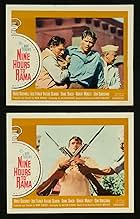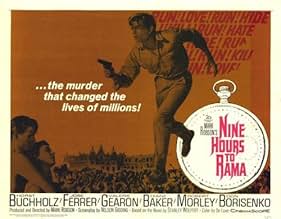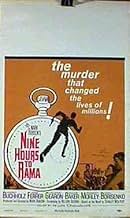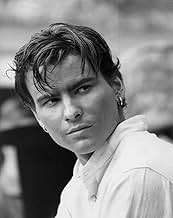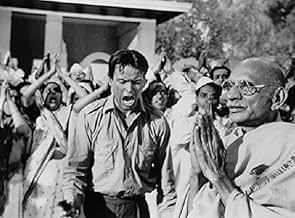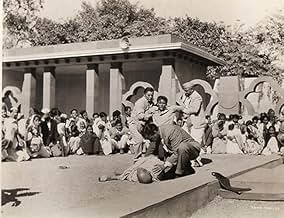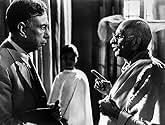Ajouter une intrigue dans votre langueFictional narrative of Hindu militant activist Nathuram Godse's plan to kill Mahatma Gandhi and of police officer Gopal Das' task to find the killer before it's too late.Fictional narrative of Hindu militant activist Nathuram Godse's plan to kill Mahatma Gandhi and of police officer Gopal Das' task to find the killer before it's too late.Fictional narrative of Hindu militant activist Nathuram Godse's plan to kill Mahatma Gandhi and of police officer Gopal Das' task to find the killer before it's too late.
- Nominé pour le prix 1 BAFTA Award
- 1 nomination au total
Paidi Jairaj
- G.D. Birla
- (as Jairaj)
Achala Sachdev
- Mother
- (as Achla Sachdev)
Nagendra Nath
- Magin Mehta
- (as Narendra Nath)
Bobby R. Naidoo
- Retiring Room Manager
- (as Bobby Naidoo)
Avis en vedette
This is a somewhat fictional account of the assassination of Mahatma Gandhi. The film starts off really well, and has a good climax (unless, of course, you're Gandhi), but it drags a bit in the middle as we learn about the assassin and his motivation. Horst Buchholz plays the killer; oddly, he seems less repulsive than usual, so that's a plus. Jose Ferrer is the policeman trying to track him down. A few British actors show up in small roles. The big revelation to me was the British actress Valerie Gearon, as the upper-class Indian whom Buchholz loves. I hadn't seen her in anything before; she is quite striking. Diane Baker has a small part as an Indian, and is semi-believable. Gandhi is played by J. S. Casshyap, and he certainly looks the part.
It would be great if this existed on DVD with commentary since there are holes in the plot that require explanation. It's probably worth a look, if you can tolerate the flashback sequences.
It would be great if this existed on DVD with commentary since there are holes in the plot that require explanation. It's probably worth a look, if you can tolerate the flashback sequences.
NINE HOURS TO RAMA distinguishes itself in the category of "historical fiction." While remaining faithful to Stanley Wolpert's novel, it perfectly captures the political tension of post-independence India which led to the murder of Mahatma Gandhi on 30 January 1948.
Nelson Gidding's screenplay eliminates some of the clutter of the novel, limits the flashbacks to the background of the assassin, Nathuram Godse, and maintains a good pace through the painful climax. Director Mark Robson (THE HARDER THEY FALL, VON RYAN'S EXPRESS), with the help of cinematographer Arthur Ibbetson, makes good use of the diverse landscape and people of India. Robson's international leads portray Indians with intelligence and sensitivity, blending expertly with many Indian supporting actors.
In making the transition from an exuberant 18-year old to an embittered fanatic of 30-plus, Horst Buchholz delivers an intense, focused performance as Godse, the real-life killer. Don Borisenko is his partner Apte, plagued by doubt and fear, and straining to reconcile his fateful mission with the tenets of his Hindu faith. The biggest liberty taken with history is the addition of a sophisticated, married woman with whom Godse falls in love, played by the lovely, elegant Valerie Gearon.
Jose Ferrer is superb as the Delhi police inspector desperately trying to prevent the inevitable, but hamstrung by the target himself. His frustration is shared by Harry Andrews, unrecognizable as a Sikh general. Robert Morley is fabulous as the parliamentarian whose hard-headed politics clashes with Gandhi's idealism. The gorgeous Diane Baker plays a prostitute who provides Godse with some much-needed refuge.
By far, the most inspired piece of casting is that of a former teacher, J. S. Casshyap, as Mahatma Gandhi. (Yes, HE is Indian!) His scenes, however brief, are the most startling. His resemblance to the great leader -- face, body, and voice -- is nothing short of remarkable, even more so than Ben Kingsley in the second half of GANDHI. It is one of the many injustices of the film world, that Casshyap was never even nominated for an Oscar for "Best Supporting Actor."
Robson and his crew deserve high praise for their fidelity to the subject matter and the professionalism of its execution, from Saul Bass's chilling opening credits (showing the inner workings of a stopwatch) and Malcolm Arnold's magnificent score, through the costume and production design, all the way to the brilliantly staged and edited assassination sequence. The result is one of the most underrated films of the 1960's.
I am furious that this is not available on VHS or DVD; in fact it should be in the widescreen format! One can only hope that 20th Century Fox will someday rectify the situation.
Nelson Gidding's screenplay eliminates some of the clutter of the novel, limits the flashbacks to the background of the assassin, Nathuram Godse, and maintains a good pace through the painful climax. Director Mark Robson (THE HARDER THEY FALL, VON RYAN'S EXPRESS), with the help of cinematographer Arthur Ibbetson, makes good use of the diverse landscape and people of India. Robson's international leads portray Indians with intelligence and sensitivity, blending expertly with many Indian supporting actors.
In making the transition from an exuberant 18-year old to an embittered fanatic of 30-plus, Horst Buchholz delivers an intense, focused performance as Godse, the real-life killer. Don Borisenko is his partner Apte, plagued by doubt and fear, and straining to reconcile his fateful mission with the tenets of his Hindu faith. The biggest liberty taken with history is the addition of a sophisticated, married woman with whom Godse falls in love, played by the lovely, elegant Valerie Gearon.
Jose Ferrer is superb as the Delhi police inspector desperately trying to prevent the inevitable, but hamstrung by the target himself. His frustration is shared by Harry Andrews, unrecognizable as a Sikh general. Robert Morley is fabulous as the parliamentarian whose hard-headed politics clashes with Gandhi's idealism. The gorgeous Diane Baker plays a prostitute who provides Godse with some much-needed refuge.
By far, the most inspired piece of casting is that of a former teacher, J. S. Casshyap, as Mahatma Gandhi. (Yes, HE is Indian!) His scenes, however brief, are the most startling. His resemblance to the great leader -- face, body, and voice -- is nothing short of remarkable, even more so than Ben Kingsley in the second half of GANDHI. It is one of the many injustices of the film world, that Casshyap was never even nominated for an Oscar for "Best Supporting Actor."
Robson and his crew deserve high praise for their fidelity to the subject matter and the professionalism of its execution, from Saul Bass's chilling opening credits (showing the inner workings of a stopwatch) and Malcolm Arnold's magnificent score, through the costume and production design, all the way to the brilliantly staged and edited assassination sequence. The result is one of the most underrated films of the 1960's.
I am furious that this is not available on VHS or DVD; in fact it should be in the widescreen format! One can only hope that 20th Century Fox will someday rectify the situation.
Despite periodic attempts by his family to rehabilitate him, Natu Ram Ghodse remains **unperson** in India. It is illegal to publish his name or likeness, with the intention of wiping out all memory of the assassin of Mahatma Gandhi.
The astonishing portrayal of the magnicide Ghodse by young Horst Buchholz shows that it is possible on an emotional level to empathize with an unsympathetic character.
The casting probably is the best thing about this picture--that and the exceptional local color of the cinematography. Buchholtz was German born and bred, yet there always was something, well...Asiatic about his looks. Darken his complexion a bit and he makes a convincing Hindu. The most inspired casting of all however was J. S. Casshyap as Gandhi. Casshyap was a university professor, Indian but entirely at home in English, and this was his first film role. His last, too so far as is known. Seeing him bent over a simple spinning wheel really is like seeing the Great Soul himself on the last day of his life.
Many commenters have remarked the effective opening titles but none seem to get the significance of showing the steady unwinding of a watch's mainspring, with driving, rhythmic Indian music in the background. Time...time is passing...time is running out--for Mohandas Gandhi, for India, for the world.
The astonishing portrayal of the magnicide Ghodse by young Horst Buchholz shows that it is possible on an emotional level to empathize with an unsympathetic character.
The casting probably is the best thing about this picture--that and the exceptional local color of the cinematography. Buchholtz was German born and bred, yet there always was something, well...Asiatic about his looks. Darken his complexion a bit and he makes a convincing Hindu. The most inspired casting of all however was J. S. Casshyap as Gandhi. Casshyap was a university professor, Indian but entirely at home in English, and this was his first film role. His last, too so far as is known. Seeing him bent over a simple spinning wheel really is like seeing the Great Soul himself on the last day of his life.
Many commenters have remarked the effective opening titles but none seem to get the significance of showing the steady unwinding of a watch's mainspring, with driving, rhythmic Indian music in the background. Time...time is passing...time is running out--for Mohandas Gandhi, for India, for the world.
Narayan: "What would happen to us in the next life if Gandhi calls out to Rama, and we have killed him? We will be vile things in the next life."
Nathu: "He will not call out to Rama, I swear! He will not." With a look of doubt on his face.
He was Gandhi's admirer in his early years but then under the influence of VD Savarkar he came to disapprove of Gandhiji's 'non-violence' ideology and became a devotee of hindutva.(which is currently in vogue, gradually preponderating). He had an affair with a married woman who was Gandhiji's follower and one of the what-if conjecture is that if she had agreed to run away with him just before he was to reach Birla house, Gandhiji would have lived 135 years !!!!
This movie is based on a book by Stanley Wolpert's that was published in 1962 but soon after was banned in India. The Nehruvian india also banned the movie. The possible reasons could be because Gandhi appears only in few pages of the book and the movie shows some alcohol and sex-driven account of Godse. But the government's failure could also be one of the reasons as they did have an intel of a possible assassin but still they failed to enforce additional security measures. Why were the fence around the Birla House and the compound not secured and monitored ????
The movie was made in 1963... Horst Bucholtz's (The Magnificent Seven fame) performance is well-fitting. However, the most cast including protagonist and principal characters are being played by white people with faces painted brown!!!! Why??? No English speaking actor was available back then? How about Sanjeev Kumar??? Tongue-in-cheek ... J S Kashyap is a perfect choice for the Gandhi role.. and he shines even his screen presence is limited to only few brief moments .. Many prominent Gandhians including my grandfather who was very close to Sardar Patel requested clemency for the Godse. As Gandhiji too was in favor of abolishing the death penalty. However, since death penalty still existed at the time, it was just fair to sentence him as justice must prevail!
Do you know that Nathuram Godse's niece was married to Veer Savarkar's nephew?
"It is because I have failed that you both (police superintendent and killer (Godse ) carry a gun. The weakest possess the most strength! Humility is power and non-violence will conquer over the violence though it will take thousand years. Woukd you like me to linger around fir another thousand years? " - Gandhiji Watch Nine Hours to Rama, available on YouTube.
He was Gandhi's admirer in his early years but then under the influence of VD Savarkar he came to disapprove of Gandhiji's 'non-violence' ideology and became a devotee of hindutva.(which is currently in vogue, gradually preponderating). He had an affair with a married woman who was Gandhiji's follower and one of the what-if conjecture is that if she had agreed to run away with him just before he was to reach Birla house, Gandhiji would have lived 135 years !!!!
This movie is based on a book by Stanley Wolpert's that was published in 1962 but soon after was banned in India. The Nehruvian india also banned the movie. The possible reasons could be because Gandhi appears only in few pages of the book and the movie shows some alcohol and sex-driven account of Godse. But the government's failure could also be one of the reasons as they did have an intel of a possible assassin but still they failed to enforce additional security measures. Why were the fence around the Birla House and the compound not secured and monitored ????
The movie was made in 1963... Horst Bucholtz's (The Magnificent Seven fame) performance is well-fitting. However, the most cast including protagonist and principal characters are being played by white people with faces painted brown!!!! Why??? No English speaking actor was available back then? How about Sanjeev Kumar??? Tongue-in-cheek ... J S Kashyap is a perfect choice for the Gandhi role.. and he shines even his screen presence is limited to only few brief moments .. Many prominent Gandhians including my grandfather who was very close to Sardar Patel requested clemency for the Godse. As Gandhiji too was in favor of abolishing the death penalty. However, since death penalty still existed at the time, it was just fair to sentence him as justice must prevail!
Do you know that Nathuram Godse's niece was married to Veer Savarkar's nephew?
"It is because I have failed that you both (police superintendent and killer (Godse ) carry a gun. The weakest possess the most strength! Humility is power and non-violence will conquer over the violence though it will take thousand years. Woukd you like me to linger around fir another thousand years? " - Gandhiji Watch Nine Hours to Rama, available on YouTube.
I watched this film completely at random from my library of "old VHS" I thought it to be a very good production, but probably of marginal interest to today's public.
After I realized what the movie really portrayed, I was fascinated to pursue some of the other comments, a piece of history that has been "missed." Really some of this is very relevant to what is happening today. I very much appreciate the sentiments pro or con in the above reviews.
Good movie overall, I'll not comment on the production, but would make the following observations: Bucholz - great performance, but where did he go from here? (I did see the obit); Ferrer - very impressed with his handling of his role; Morley - miscast and not in character
Lastly. this was an AngloHollywood production of an IndoPakistani historic event. A Bollywood reproduction might prove interesting!
After I realized what the movie really portrayed, I was fascinated to pursue some of the other comments, a piece of history that has been "missed." Really some of this is very relevant to what is happening today. I very much appreciate the sentiments pro or con in the above reviews.
Good movie overall, I'll not comment on the production, but would make the following observations: Bucholz - great performance, but where did he go from here? (I did see the obit); Ferrer - very impressed with his handling of his role; Morley - miscast and not in character
Lastly. this was an AngloHollywood production of an IndoPakistani historic event. A Bollywood reproduction might prove interesting!
Le saviez-vous
- AnecdotesAccording to Richard Attenborough, this film was one of the major reasons why his Gandhi had major problems with the Indian Government for many years.
- GaffesWhen Horst is walking in Delhi from his room towards the house where Gandhi was staying, he looks idly over a wall by the road. The camera looks over, and there is a mass of people doing laundry. It's the famous Dhobi Ghat in Bombay, 700 miles from Delhi.
- ConnexionsEdited into Bass on Titles (1982)
Meilleurs choix
Connectez-vous pour évaluer et surveiller les recommandations personnalisées
- How long is Nine Hours to Rama?Propulsé par Alexa
Détails
Box-office
- Budget
- 3 610 000 $ US (estimation)
- Durée2 heures 4 minutes
- Couleur
- Rapport de forme
- 2.35 : 1
Contribuer à cette page
Suggérer une modification ou ajouter du contenu manquant


